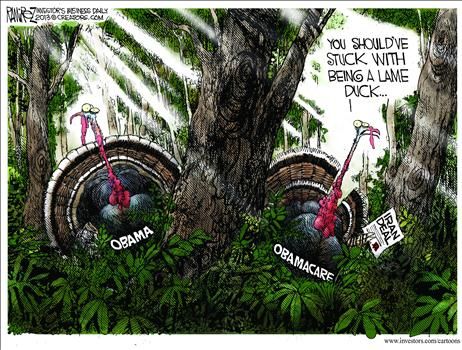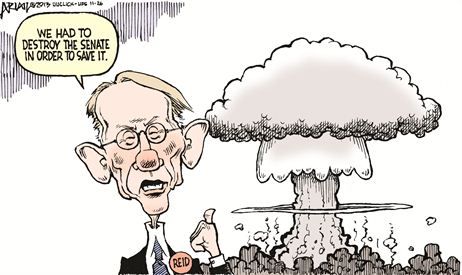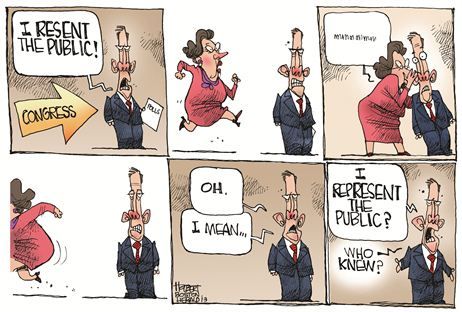Any one whose labors take him into the far
reaches of the country, as ours lately have done, is bound to mark how
the years have made the land grow fruitful.
This
is indeed a big country, a rich country, in a way no array of figures
can measure and so in a way past belief of those who have not seen it.
Even those who journey through its Northeastern complex, into the
Southern lands, across the central plains and to its Western slopes can
only glimpse a measure of the bounty of America.
And a traveler cannot but be struck
on his journey by the thought that this country, one day, can be even
greater. America, though many know it not, is one of the great
underdeveloped countries of the world; what it reaches for exceeds by
far what it has grasped.
So the visitor
returns thankful for much of what he has seen, and, in spite of
everything, an optimist about what his country might be. Yet the
visitor, if he is to make an honest report, must also note the air of
unease that hangs everywhere.
For the
traveler, as travelers have been always, is as much questioned as
questioning. And for all the abundance he sees, he finds the questions
put to him ask where men may repair for succor from the troubles that
beset them.
His countrymen cannot forget
the savage face of war. Too often they have been asked to fight in
strange and distant places, for no clear purpose they could see and for
no accomplishment they can measure. Their spirits are not quieted by the
thought that the good and pleasant bounty that surrounds them can be
destroyed in an instant by a single bomb. Yet they find no escape, for
their survival and comfort now depend on unpredictable strangers in
far-off corners of the globe.
How can
they turn from melancholy when at home they see young arrayed against
old, black against white, neighbor against neighbor, so that they stand
in peril of social discord. Or not despair when they see that the cities
and countryside are in need of repair, yet find themselves threatened
by scarcities of the resources that sustain their way of life. Or when,
in the face of these challenges, they turn for leadership to men in high
places—only to find those men as frail as any others.
So
sometimes the traveler is asked whence will come their succor. What is
to preserve their abundance, or even their civility? How can they pass
on to their children a nation as strong and free as the one they
inherited from their forefathers? How is their country to endure these
cruel storms that beset it from without and from within?
Of
course the stranger cannot quiet their spirits. For it is true that
everywhere men turn their eyes today much of the world has a truly wild
and savage hue. No man, if he be truthful, can say that the specter of
war is banished. Nor can he say that when men or communities are put
upon their own resources they are sure of solace; nor be sure that men
of diverse kinds and diverse views can live peaceably together in a time
of troubles.
But we can all remind
ourselves that the richness of this country was not born in the
resources of the earth, though they be plentiful, but in the men that
took its measure. For that reminder is everywhere—in the cities, towns,
farms, roads, factories, homes, hospitals, schools that spread
everywhere over that wilderness.
We can
remind ourselves that for all our social discord we yet remain the
longest enduring society of free men governing themselves without
benefit of kings or dictators. Being so, we are the marvel and the
mystery of the world, for that enduring liberty is no less a blessing
than the abundance of the earth.
And we
might remind ourselves also, that if those men setting out from
Delftshaven had been daunted by the troubles they saw around them, then
we could not this autumn be thankful for a fair land.
The 19th-century editor who pestered five presidents to make it a national holiday.
By Rich Lowry
It was 150 years ago that Sarah Josepha Hale gave us Thanksgiving as we know it.
The influential editor was the best friend Thanksgiving ever had. We are accustomed, in a more jaded and secular age, to wars on various holidays; Hale waged a war for
Thanksgiving. For years, she evangelized for nationalizing the holiday
by designating the last Thursday of November for it to be celebrated
annually across the country.
Besides plugging for Thanksgiving in her publication, Godey’s Lady’s Book,
she wrote Presidents Taylor, Fillmore, Pierce, and Buchanan about it
before hitting pay dirt with Abraham Lincoln. On October 3, 1863,
Lincoln urged his fellow citizens to observe the last Thursday of
November “as a day of Thanksgiving and Praise to our beneficent Father
who dwelleth in the Heavens.”
Hale had succeeded in her long-sought goal, but kept — as Peggy Baker notes in an essay
about her as “the Godmother of Thanksgiving” — writing editorials about
Thanksgiving for another dozen years. You might say that she was a bore
and nag on the topic, if her cause hadn’t been so splendid and her
understanding of Thanksgiving so clear-eyed, clairvoyant even.
Hale
saw the Fourth of July and Thanksgiving as the twin festivals of the
American people, “each connected with their history, and therefore of
great importance in giving power and distinctness to their nationality,”
as she put it in an 1852 editorial.
July Fourth celebrated
national independence and liberty, while Thanksgiving acknowledged God
“as the dispenser of blessings.” She argued that “these two festivals
should be joyfully and universally observed throughout our whole
country, and thus incorporated in our habits of thought as inseparable
from American life.”
Of course, Thanksgiving had existed on these
shores long before Hale took it up as a cause. Her description of a New
England Thanksgiving feast in her 1827 novel Northwood would
have been recognized by Norman Rockwell, and could apply with equal
accuracy to the average American home today. She described the table
“now intended for the whole household, every child having a seat on this
occasion; and the more the better.”
“The roasted turkey took
precedence,” she wrote, “being placed at the head of the table; and well
did it become its lordly station, sending forth the rich odor of its
savory stuffing, and finely covered with the froth of the basting.”
The
dessert course is almost as recognizable: “There was a huge plum
pudding, custards and pies of every name and description ever known in
Yankee land; yet the pumpkin pie occupied the most distinguished niche.”
Thanksgiving
had always been held in autumn, Hale explains in the book, “the time
when the overflowing garners of America call for this expression of
joyful gratitude.” But different states held it on different days, and
the holiday tradition was strongest in New England. Hale wanted to
guarantee Thanksgiving’s place in America’s firmament by making it a
national day.
She quoted the 19th-century British writer Robert
Southey in making her case. “Festivals, when duly observed, attach men
to the civil and religious institutions of their country,” he wrote.
“Who is there who does not recollect their effect upon himself in early
life?”
Hale understood the particular pull of Thanksgiving. She
wrote in 1837, “It is a festival which will never become obsolete, for
it cherishes the best affections of the heart — the social and domestic
ties.” (Although her faith in family bonds, re-fortified around the
Thanksgiving table, might have been a touch naïve: “How can we hate our
Mississippi brother-in-law? And who is a better fellow than our wife’s
uncle from St. Louis?”)
In her 1852 editorial, she predicted that
“wherever an American is found, the last Thursday would be the
Thanksgiving Day. Families may be separated so widely that personal
reunion would be impossible; still this festival, like the Fourth of
July, will bring every American heart into harmony with his home and his
country.” And so it does, still.
























